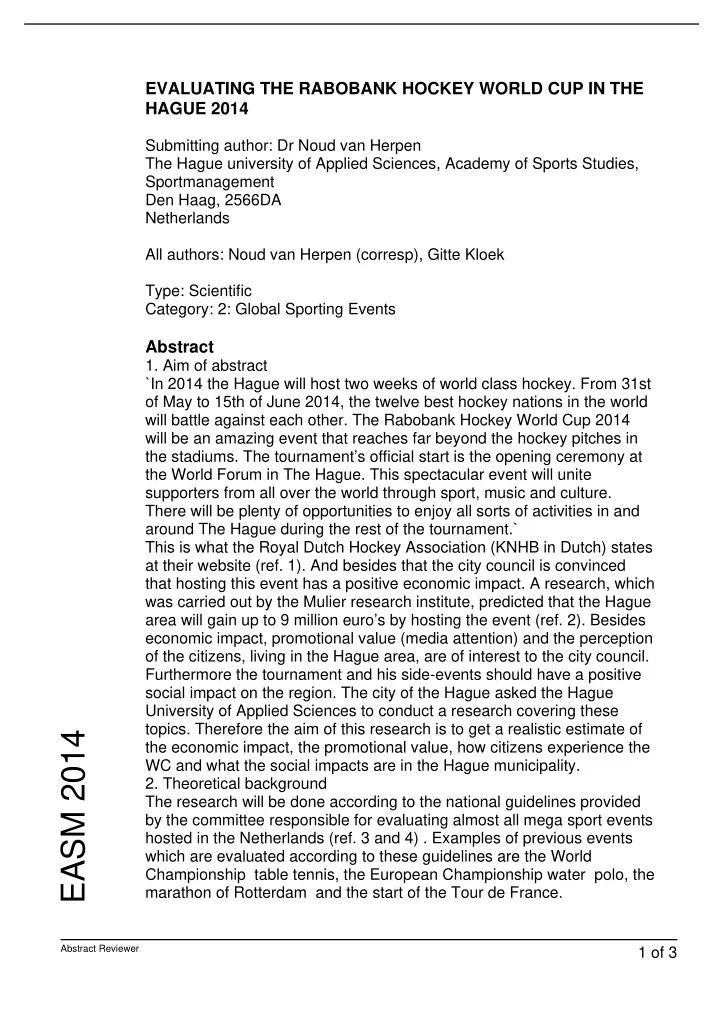

EVALUATING THE RABOBANK HOCKEY WORLD CUP IN THE HAGUE 2014 Submitting author: Dr Noud van Herpen The Hague university of Applied Sciences, Academy of Sports Studies, Sportmanagement Den Haag, 2566DA Netherlands All authors: Noud van Herpen (corresp), Gitte Kloek Type: Scientific Category: 2: Global Sporting Events Abstract 1.�Aim of abstract� `In 2014 the Hague will host two weeks of world class hockey. From 31st of May to 15th of June 2014, the twelve best hockey nations in the world will battle against each other. The Rabobank Hockey World Cup 2014 will be an amazing event that reaches far beyond the hockey pitches in the stadiums. The tournament’s official start is the opening ceremony at the World Forum in The Hague. This spectacular event will unite supporters from all over the world through sport, music and culture. There will be plenty of opportunities to enjoy all sorts of activities in and around The Hague during the rest of the tournament.` � This is what the Royal Dutch Hockey Association (KNHB in Dutch) states at their website (ref. 1). And besides that the city council is convinced that hosting this event has a positive economic impact. A research, which was carried out by the Mulier research institute, predicted that the Hague area will gain up to 9 million euro’s by hosting the event (ref. 2). Besides economic impact, promotional value (media attention) and the perception of the citizens, living in the Hague area, are of interest to the city council. Furthermore the tournament and his side-events should have a positive social impact on the region. The city of the Hague asked the Hague University of Applied Sciences to conduct a research covering these topics. Therefore the aim of this research is to get a realistic estimate of EASM 2014 the economic impact, the promotional value, how citizens experience the WC and what the social impacts are in the Hague municipality.� 2.�Theoretical background � The research will be done according to the national guidelines provided by the committee responsible for evaluating almost all mega sport events hosted in the Netherlands (ref. 3 and 4) . Examples of previous events which are evaluated according to these guidelines are the World Championship table tennis, the European Championship water polo, the marathon of Rotterdam and the start of the Tour de France.� Abstract Reviewer 1 of 3
3.�Methodology.� To estimate the economic impact over 3000 questionnaires will be collected from visitors, competitors and team members, VIP’s and media professionals. The questionnaires will be gathered at the official venue which will consist of 2 stadiums (capacity 15.000 and 5.000), a press center, restaurants, shopping area and more, the Hague Hockey square located in the city center which will arise right next to the Dutch parliament and at the Grand Masters Hockey World Cup. This tournament will have competitions in the 60+, 65+, 70+ and 75+ age groups and attracts over 1500 competitors and spectators from over 15 countries around the world. � � Media attention will be divided in television and radio coverage, local and national newspapers and other media such as the internet and social media. Also all media which was provided by the organization to promote the event will be taking into account. Promotional impact will be primarily based on time of coverage, size of the article and number of people reached. An estimation of what this media attention is worth moneywise will be based on the costs of placing an advertisement of similar size/time in the particular media. � � How the residents of the municipality experience the WC Hockey will be addressed by sending over 3000 questionnaires to random home addresses in the Hague and the surrounding region. Questions that will be asked will address (sleep) disturbance, anxiety, to what extent they are satisfied with the organization of the event and which determinants affect the perception of the event. Furthermore questions about communication and desires for future events will be asked. � � And finally social impact will be estimated by evaluating several side- events. During the side-events the number of participants, the increase in sport participation, whether participants know and/or will go to the main event are some of the facts that will be addressed in this part of the research.� � 4.�Results, discussion and implications/conclusions� As the WC field hockey is from the 31st of May to the 15th of June no results are known yet but the author guarantees that the results will be EASM 2014 presented at the conference. References 1.KNHB (2013). Rabobank Hockey World Cup 2014. viewed on 5 januari 2014, from https://rabobankhockeyworldcup2014.nl/andere-activiteiten� � 2.Hover, P. Oldenboom, E. Straatmeijer, J. Kock, J. (2013). Prognose economische impact Rabobank Hockey World Cup 2014. from http://www.evenementenevaluatie.nl/onderzoeken/� Abstract Reviewer 2 of 3
� � 3. Werkgroep Evaluatie Sportevenementen (2010). Richtlijnen handboek ‘Economische impact’ from http://www.evenementenevaluatie.nl/wp- content/uploads/2012/04/WESP-richtlijnenhandboek-Economische- impact-v1.pdf� � 4. Werkgroep Evaluatie Sportevenementen (2010). Richtlijnen handboek ‘Beleving’’. from: http://www.evenementenevaluatie.nl/wp- content/uploads/2012/04/WESP-richtlijnenhandboek-beleving-v1.pdf EASM 2014 Abstract Reviewer 3 of 3
Recommend
More recommend